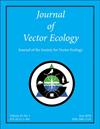Life cycle of Triatoma huehuetenanguensis Lima-Cordón, Monroy, Stevens, Rodas, Rodas, Dorn, Justi 2019 (Hemiptera: Reduviidae: Triatominae) from Mexico
IF 1.3
3区 农林科学
Q2 ENTOMOLOGY
引用次数: 3
Abstract
ABSTRACT: Several important biological parameters for estimating the vectorial capacity of a triatomine species were determined on a Mexican population of the recently described Triatoma huehuetenanguensis Lima-Cordón, Monroy, Stevens, Rodas, Rodas, Dorn, Justi (Hemiptera: Reduviidae: Triatominae). The biological parameters were the egg-to-adult development time, number of blood meals required for molting, cumulative mortality, onset time for feeding, feeding and defecation behaviors, and fertility and fecundity of T. huehuetenanguensis. The median egg-to-adult development time was 253 days, with 11 blood meals required for molting. A cumulative mortality rate of 47.41% was observed. The time to begin feeding was between 2.5 and 3.5 min. Feeding times were longer than 15 min. The highest percentages of defecation delays were 1 to 10 min in all nymphal instars and also in males. In contrast, significantly (P < 0.01) more females defecated while eating. At the end of the cycle, the percentage of the obtained females was 54.9%. The mean number of eggs laid per day per female for a month was 2.08. These eggs had an eclosion rate of 98.08%, with an incubation period of 19 days. Our results contribute to estimations of the potential role of T. huehuetenanguensis in the transmission of Trypanosoma cruzi in its distribution area.墨西哥胡埃特南格Triatoma huehuetenanguensis Lima Cordón、Monroy、Stevens、Rodas、Rodas,Dorn、Justi 2019的生命周期
摘要:在最近描述的墨西哥胡埃埃特南古氏三角虫(Triatoma huehuetenanguensis Lima Cordón,Monroy,Stevens,Rodas,Rodas)、多恩(Dorn)、贾斯蒂(Justi)种群中,确定了几个重要的生物学参数,用于估计一个三角虫物种的矢量能力。生物学参数为胡埃特南格T.huehuetenanguensis的卵至成虫发育时间、蜕皮所需的血餐次数、累积死亡率、进食、进食和排便行为的开始时间以及生育能力和繁殖力。卵子到成虫的平均发育时间为253天,蜕皮需要11份血液餐。观察到累计死亡率为47.41%。开始喂食的时间在2.5到3.5分钟之间。喂食时间超过15分钟。所有若虫龄和雄性的排便延迟百分比最高,为1到10分钟。相反,进食时排便的女性明显增多(P<0.01)。在周期结束时,获得的雌性的百分比为54.9%。一个月内,每只雌性每天平均产卵量为2.08枚。这些卵的羽化率为98.08%,孵化期为19天。我们的研究结果有助于估计胡埃特南锥虫在其分布区传播克鲁兹锥虫的潜在作用。
本文章由计算机程序翻译,如有差异,请以英文原文为准。
求助全文
约1分钟内获得全文
求助全文
来源期刊

Journal of Vector Ecology
生物-昆虫学
CiteScore
2.60
自引率
5.90%
发文量
31
审稿时长
6-12 weeks
期刊介绍:
The Journal of Vector Ecology is an international journal published by the Society for Vector Ecology. It is concerned with all aspects of the biology, ecology, and control of arthropod and vertebrate vectors and the interrelationships between the vectors and the agents of disease that they transmit. The journal publishes original research articles and scientific notes, as well as comprehensive reviews of vector biology based on presentations at Society meetings. All papers are reviewed by at least two qualified scientists who recommend their suitability for publication. Acceptance of manuscripts is based on their scientific merit and is the final decision of the editor, but these decisions may be appealed to the editorial board. The journal began publishing in 1974 and now publishes on-line only.
 求助内容:
求助内容: 应助结果提醒方式:
应助结果提醒方式:


